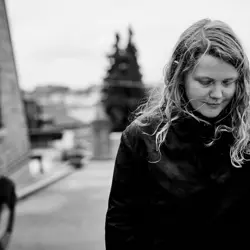 Kate Tempest
Kate TempestOn her latest record, The Book Of Traps And Lessons, Kate Tempest and long-time producer Dan Carey were trying – over the course of about five years, during which they also crafted her Mercury-nominated 2016 record, Let Them Eat Chaos – to break convention by moving away from their usual techniques.
“We were looking for a new form essentially, something that was completely different,” Tempest explains, adding that they were trying to avoid the things that make them comfortable.
“For me, the things that make me comfortable are rap technique and flow, or narrative devices, or cleverly constructed character portraits, all of these kind of things are the things that make me feel secure.”
Spurred on by co-producer Rick Rubin (Jay-Z, James Blake), Tempest and Carey were challenged to “forget everything we knew about what made us feel good creatively and try to get to the core and to see if we could still function there”.
“What is the absolute essential core thing of the lyric, of me, of what I do?” Tempest ponders.
“What is the absolute essential core thing of the lyric, of me, of what I do?”
The album ends up as empathetic, vulnerable and honest as any of Tempest’s work, from 2016 novel The Bricks That Built The Houses to her latest poetry collection, last year’s Running Upon The Wires. But, unlike her earlier work, such as 2014’s breakout record Everybody Down, The Book Of Traps And Lessons is rooted more in an experience than a vivid sense of place.
Don't miss a beat with our FREE daily newsletter
“I feel like I've got out of my system what I have to get out of my system about growing up in south London. I feel older now – I'm 33. I feel like the first batch of my work was dealing with some stuff that had come up for me in my adolescence and in my 20s.
“London's a changing place and I had to make a record of it before it changed forever in front of my eyes. The London of my childhood and of my youth, it doesn't exist anymore. Also I'm not there anymore either, so it was this relentless, furious push to get this work made when I was growing up, I suppose, and establishing myself as an artist and as a writer.
“I feel like [this album is] more open in its landscape. It shifts from being somebody at a train station to somebody in a desert. There's all these metaphorical landscapes that are less rooted in place.”
For Tempest, her approach to songwriting, brimming with apparent sensitivity and insight, is “a complete mystery”.
“I don't know where it comes from or why it comes to me. You just do your best to make sure that you're ready when it comes out of the sky into your brain – you might be able to put it on a piece of paper and eventually get it down on record. Sometimes the song just is because it is.”
Tempest doesn’t allow herself to think about how the stripped-back The Book Of Traps And Lessons may be perceived by her fans – once the record is finished, she maintains, her work is over, and “it’s got nothing to do with me anymore”.
“It's about whoever finds it, reads it, listens to it, engages with it. Then whatever they think of it is what it is. If they think it's a piece of shit, that's what it is. If they think it's ultimately hopeful, that's what it is.
“My relationship with it is so intimate and intense and it's everything that I fucking live for, and then you make it and you have to say, ‘I don't know what's going to happen to this now. I'm putting it out there, and I'm gonna move away from it.’”
The next step for Tempest is taking The Book Of Traps And Lessons to audiences through extensive touring, which, like the creative process – “the act of creativity is an act of love” – is a fundamentally hopeful act.
“You get this renewing possibility because each time you go out on stage you get a chance to discover these lyrics again and read them a new way and deliver them a new way to people.
“When I'm performing I definitely want it to be hopeful. I want it to connect. My responsibility as a maker of artwork is to encourage an environment for connection.”
For Tempest, the role of an artist, a storyteller, in 2019 is inextricably tied to raising awareness – she explains that people under capitalism are “numb”. Capitalism, she says, encourages not only numbness but “exploitation and violence, despair, rootlessness”.
“As storytellers, music-makers, makers of artwork, our responsibility is to offer some kind of vitality as an antidote to this numbness, as temporary as it might be. When I am at my numbest, I'm often brought back to life by watching somebody sing or listening to an album or reading somebody else's work.
“I believe that that's our responsibility in this time – to reconnect with ourselves, with our bandmates, with our audiences, with people that are listening to our work or reading our stories, because even just a temporary, fleeting moment of reconnection is extremely important in raising consciousness.”
Still, such a lofty goal makes it sound like there’s no place for humour in Tempest’s songs, emerging as they do out of the depths of post-Brexit Britain.
“There's a lot of humour in my work. Life's funny, isn't it? People are funny,” Tempest laughs. “I like to think I enjoy myself quite often. My work can be serious, but I have the opinion that things are extremely bizarre. There is the element of the absolutely, brilliantly surreal about everything – the closer you observe it the funnier it is.”















